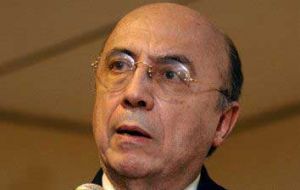MercoPress. South Atlantic News Agency
Brazilian government and private sector differ on rates and strong Real
 Meirelles praised government banks for lowering rates
Meirelles praised government banks for lowering rates Brazilian private banks should follow state lenders and lower interest rates to help drive a rebound of the economy, said Central Bank President Henrique Meirelles during a seminar last week in Sao Paulo. He also stated that the Central Bank policy is geared to an accumulation of reserves “to improve the country’s resistance to the crisis”.
Both issues have triggered a heated debate about whether government banks are sacrificing returns by charging interest rates below the market average and if the Brazilian currency, Real, was again too strong against the US dollar because of the massive influx of foreign capital.
Meirelles said he did not share the view that public banks were lowering interest rates too aggressively, “that's not our view at the moment”.
The Central bank president statement comes in support of remarks by Finance Minister Guido Mantega and Banco do Brasil CEO Aldemir Bendine, who called on private banks to increase lending and lower rates.
Brazil’s largest private bank Itau Unibanco earlier in the week had criticized state banks for lending at “below-market rates”. But Meirelles praised state banks for their role in keeping credit flowing during the global financial crisis and helping to stoke the economic recovery of Latinamerica’s largest economy.
Regarding the strength of the Real which has gained 26% against the US dollar so far this year, recovering almost all the ground lost when the crisis broke out last September, Meirelles said that “the Central bank has a policy of (foreign currency) reserve accumulation to improve the country's resistance to the crisis”.
Although the dollar initially strengthened during the crisis because of its safe-haven status, it has since weakened considerably as investors looked to higher-risk emerging markets such as Brazil which promise better returns.
Brazil's central bank has been taking advantage of the dollar's relative weakness over the past three months to bolster its already hefty foreign reserves which have now swelled to a record 212 billion US dollars.
However this has become a main point of concern for several exporting companies. Particularly manufacturers believe Brazil could loose market share and become even more reliant on commodities exports, soy beans, iron, coffee, orange juice.
Last Friday the US dollar was equivalent to 1.85 Real after having dropped to almost 2.20 at the height of the crisis earlier this year from 1.60 before September 2008.




Top Comments
Disclaimer & comment rulesCommenting for this story is now closed.
If you have a Facebook account, become a fan and comment on our Facebook Page!